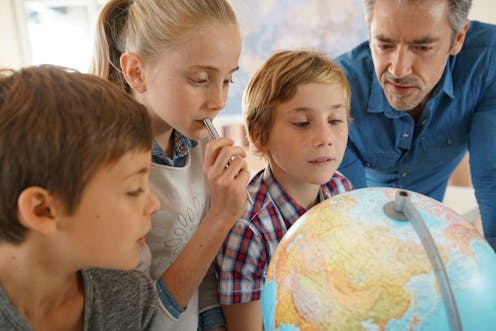Dumbed-down curriculum means primary students will learn less about the world and nothing about climate
- Written by Alaric Maude, Associate Professor of Geography, Flinders University

Revisions to the Australian primary school curriculum for geography mean children will learn much less about the world and its diversity than they do at present. They will learn nothing about some significant concepts such as climate.
The Australian Curriculum, Assessment and Reporting Authority (ACARA) launched the new version[1] of the Australian Curriculum on May 9. ACARA described[2] it as “a more stripped-back and teachable curriculum that identifies the essential content our children should learn”.
Read more: How well does the new Australian Curriculum prepare young people for climate change?[3]
Overall, the new curriculum reduces the number of content descriptions by 21%. These are statements that describe what teachers should teach and what students should learn. In primary school geography, however, 50% of the content descriptions in the Knowledge and Understanding strand have been deleted or had content reduced.
The education ministers of the governments of Australia pressured ACARA[4] to further reduce the content in the primary school humanities and social science learning areas. What is this knowledge that they have decided is no longer essential for our children to learn?
Read more: Why do Australian states need a national curriculum, and do teachers even use it?[5]
What knowledge of the world is gone?
The previous curriculum[6] had a sequence of content descriptions that gave students some knowledge of the world beyond Australia. The following have been deleted:
the division of the world into hemispheres, continents and oceans (in year 2)
the main climate types of the world and the similarities and differences between the climates of different places (in year 3)
a brief study of the continents and countries of Africa and South America (in year 4), and Europe and North America (in year 5)
differences in the economic, demographic and social characteristics of countries across the world (in year 6).
the world’s cultural diversity, including that of its indigenous peoples (in year 6).
The only world knowledge retained in the revision is the study of Australia’s neighbouring countries in year 3 and Asia in year 6. As a result, students will learn nothing about four of the continents, or of the environmental, economic, demographic and social differences and similarities between the countries of the world. They will have no sense of the world as a whole, and its diversity.
In an increasingly interconnected world, children need at least to know about the countries we are connected to through history, trade, migration, alliances and government and non-government aid.
Read more: A 'crowded curriculum'? Sure, it may be complex, but so is the world kids must engage with[7]
What key concepts have been lost?
Concepts are what we think with, and intellectual development is based on conceptual thinking. The previous curriculum developed children’s understanding of the following key concepts and ways of thinking.
The concept of place, including the definition of a place, and an understanding of the importance of places to people. The study of places is the core of primary school geography.
The concept of location, including why things are located where they are, and the influence of location and accessibility on people’s activities. These were in the curriculum to get students thinking about the effects of location and distance on their lives, and about where things should be located.
The concept of space, including the management of spaces within neighbourhoods and towns. This introduced students to debates about how land should be used and how development conflicts are resolved, and to the idea of town planning.
The concept of climate. The difference between climate and weather still confuses debate over climate change, so an understanding of this difference is vital.
The concept of a settlement, including the differences between places in types of settlement and demographic characteristics. This added another concept to students’ knowledge of places, and introduced them to the small area census data that reveal much about Australian communities.
All this content has been removed.
Read more: First, it's not an instruction manual: 3 things education ministers need to know about the Australian Curriculum[8]
What are the impacts on learning?
The revision of the primary school geography curriculum has done three things:
it has severely reduced children’s knowledge of the world
it has reduced the level of conceptual thinking that students will be exposed to
it will leave them less prepared for geography in secondary school, where the curriculum was designed on the assumption that students would know what is in the current one.
If the aim of these deletions has been to make more time for the development of literacy and numeracy skills, it is self-defeating. Children apply and develop these skills and expand their vocabulary through subjects such as geography and history.
Is this the best we can do to help young Australians understand the world? The geography curriculum for England[9] demands much more.
References
- ^ new version (v9.australiancurriculum.edu.au)
- ^ described (www.acara.edu.au)
- ^ How well does the new Australian Curriculum prepare young people for climate change? (theconversation.com)
- ^ pressured ACARA (www.smh.com.au)
- ^ Why do Australian states need a national curriculum, and do teachers even use it? (theconversation.com)
- ^ previous curriculum (www.australiancurriculum.edu.au)
- ^ A 'crowded curriculum'? Sure, it may be complex, but so is the world kids must engage with (theconversation.com)
- ^ First, it's not an instruction manual: 3 things education ministers need to know about the Australian Curriculum (theconversation.com)
- ^ geography curriculum for England (assets.publishing.service.gov.uk)

















